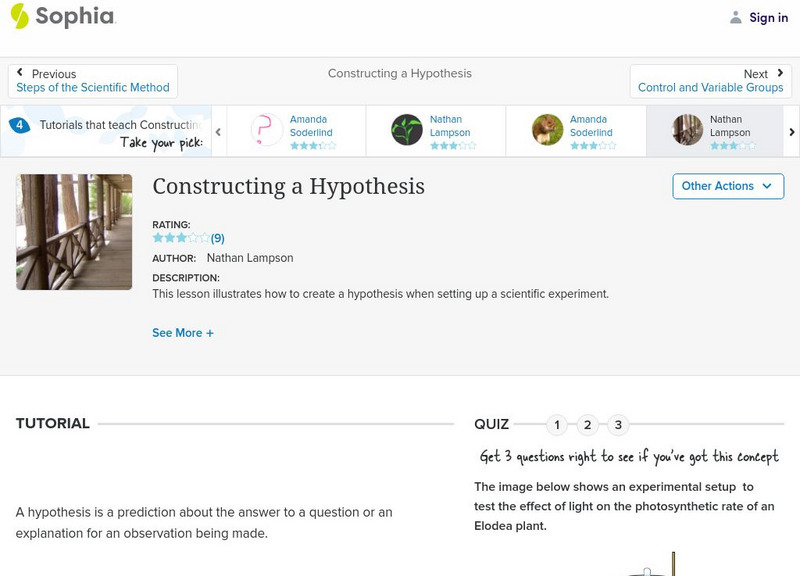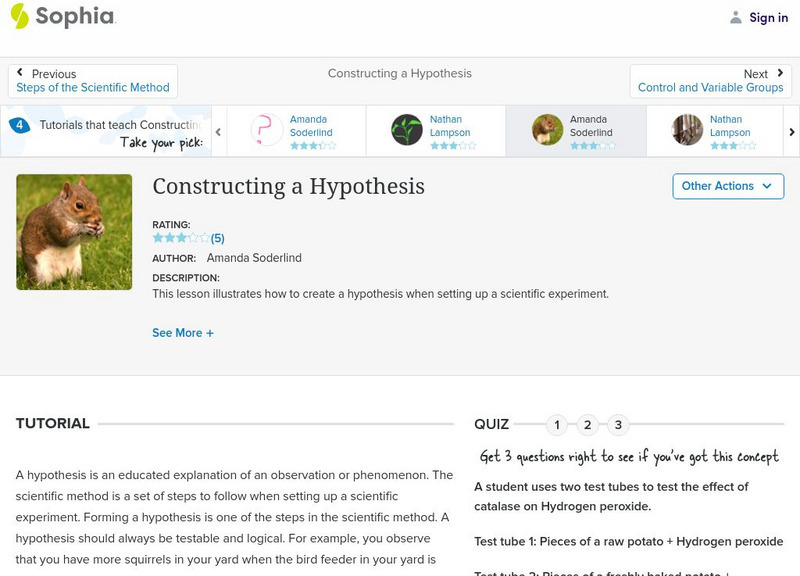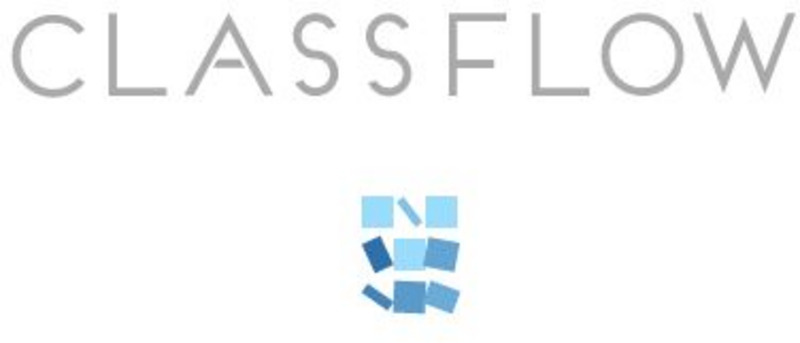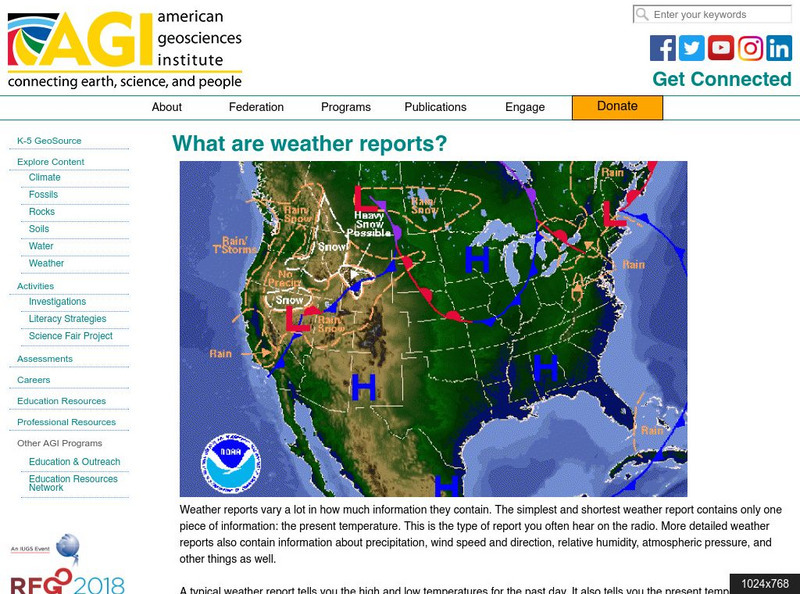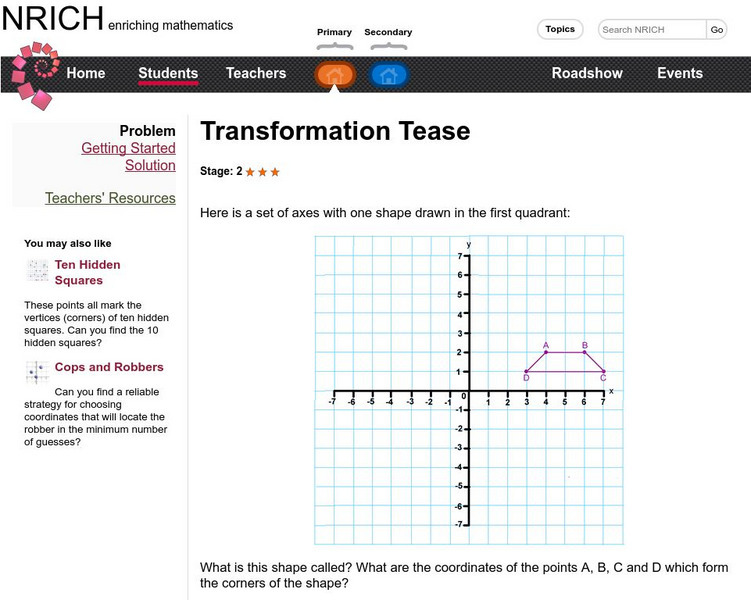Alabama Learning Exchange
Alex: Arctic Adventures
During this lesson, learners will explore plant and animal life found at the Arctic Circle. They will also learn about the dangerously cold climate and the location of the Arctic Circle relative to the school's location on maps and globes.
Khan Academy
Khan Academy: Types of Conclusions
You might find it helpful to categorize the kind of conclusion you're dealing with as you approach passages that contain arguments on the LSAT. Your success in analyzing arguments-passages with a conclusion and supporting evidence-starts...
Khan Academy
Khan Academy: Main Point Quick Guide
The first question in most Reading Comprehension sets will ask you to identify the statement that best expresses the central idea or the main point that the passage as a whole is designed to convey.
Science Museum of Minnesota
Science Museum of Minnesota: Thinking Fountain: Noodle
In this lesson design and build a structure out of spaghetti and mini marshmallows.
PBS
Pbs Mathline Lesson: Geometry, It's a Perfect Fit [Pdf]
This two-part geometry lesson plan has students identify, describe, and classify two-dimensional shapes. Students engage in hands-on activities including identifying shapes in the classroom, creating patterns with shapes, identifying...
Dan Satterfield
Dan's Wild Weather Page: Forecasting
Find out about the art and science of forecasting at this site from Dan's Wild Weather Page.
ReadWriteThink
Read Write Think: Developing Inferential Comprehension
This lesson plan uses the text "Granddaddy's Gift" in order to develop and improve comprehension, prediction, and discussion skills. Included in the lesson plan is an overview, practice, objectives, resources, preparation, and more.
Sophia Learning
Sophia: Sampling and Prediction: Lesson 3
This lesson demonstrates how sampling can help predict outcomes. It is 3 of 2 in the series titled "Sampling and Prediction."
Sophia Learning
Sophia: Sampling and Prediction: Lesson 1
This lesson demonstrates how sampling can help predict outcomes. It is 1 of 2 in the series titled "Sampling and prediction."
Sophia Learning
Sophia: Sampling & Predictions
This lesson demonstrates how sampling can help predict outcomes.
Sophia Learning
Sophia: Constructing a Hypothesis: Lesson 2
This lesson illustrates how to create a hypothesis when setting up a scientific experiment. It is 2 of 4 in the series titled "Constructing a Hypothesis."
Sophia Learning
Sophia: Constructing a Hypothesis: Lesson 3
This lesson illustrates how to create a hypothesis when setting up a scientific experiment. It is 3 of 4 in the series titled "Constructing a Hypothesis."
Sophia Learning
Sophia: Constructing a Hypothesis: Lesson 4
This lesson illustrates how to create a hypothesis when setting up a scientific experiment. It is 4 of 4 in the series titled "Constructing a Hypothesis."
ClassFlow
Class Flow: Number Square Algebra
[Free Registration/Login Required] In this flipchart, students interact with whole numbers arranged in a square to apply their arithmetic skills of multiplication, addition and subtraction.
ClassFlow
Class Flow: Puzzles
[Free Registration/Login Required] In this flipchart students use the visual and interactive features of Activstudio to solve various puzzles. Students apply their algebraic and number sense to solve problems using numbers and variables.
ClassFlow
Class Flow: Special Numbers
[Free Registration/Login Required] Analyze number patterns involving repeated addition (linear) or repeated to write an equation or rule.
ClassFlow
Class Flow: Starters
[Free Registration/Login Required] In this flipchart, students understand and apply concepts and procedures from algebraic sense. Students recognize, extend, or create a pattern or sequence between sets of numbers and/or linear patterns.
ClassFlow
Class Flow: Types of Numbers
[Free Registration/Login Required] In this flipchart, students understand and apply concepts and procedures from algebraic sense. Students apply processes that use repeated addition. Students recognize, extend and create sequences...
American Geosciences Institute
American Geosciences Institute: What Are Weather Reports?
Find out what a typical weather reports contains, and why it is important to viewers.
ClassFlow
Class Flow: Matchstick Puzzles
[Free Registration/Login Required] In this Flipchart, students use logic and mathematical reasoning to visually solve problems using matchsticks. Students develop their sense of pattern recognition, and pattern disruption, and then apply...
University of Cambridge
University of Cambridge: Nrich: Transformation Tease
Follow the directions at this one page website. You will get lots of practice plotting points on the coordinate grid and experience with transformational geometry.
Quia
Quia: Nature of Science Scientific Method Concentration
Play a game of concentration by matching terms used in the scientific method to their proper description.
Quia
Quia: Nature of Science Scientific Method Flashcards
Review the nature of science with on-line flash cards.
SMART Technologies
Smart: Inference and Prediction
Students will learn the difference between making a prediction and an inference as they engage in class discussions about both reading skills, play a game, look at art, and listen to songs.






![Pbs Mathline Lesson: Geometry, It's a Perfect Fit [Pdf] Lesson Plan Pbs Mathline Lesson: Geometry, It's a Perfect Fit [Pdf] Lesson Plan](https://d15y2dacu3jp90.cloudfront.net/images/attachment_defaults/resource/large/FPO-knovation.png)





